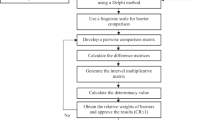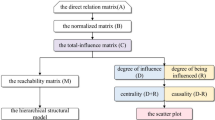Abstract
Agri-food supply chains (AFSCs) are one of the significant building blocks of agricultural production, and their sustainability aims are advanced by big data analytics (BDA) and the circular economy (CE). As access to safe, healthy, and high-quality food has become increasingly difficult, AFSCs need to leverage their capabilities for CE-based BDA to overcome sustainability challenges. However, a significant gap exists in the relevant literature on how to identify such capabilities to achieve sustainability goals. To build CE-based BDA capabilities, organisations need to orchestrate their resources and competencies and align them well with specific sustainability targets. In consideration of these issues, this study was conducted to identify the aforementioned capabilities and their effects on the performance of circular AFSCs from the perspective of a developing country. To this end, a three-stage multi-criteria decision-making model was developed and used in the examination of circular AFSCs in Turkey. The findings revealed that supply chain management (SCM) was the most important capability, followed by organizational, technical, environmental, economic, and social capabilities. Furthermore, big data infrastructure was the most important sub-capability ahead of financial benefits, top management support, sustainability and resilience, and food waste reduction. Finally, productivity improvement was determined as the most significant impact of CE-based BDA capabilities on circular AFSCs. This study can serve as a reference for managers and policy-makers on what BDA capabilities should be developed for circular AFSCs. It also contributes to addressing the agricultural production issues encountered by developing countries.


Similar content being viewed by others
Data availability
The author confirms that the datasets used in the study are available within the article.
References
Akhtar P, Frynas JG, Mellahi K, Ullah S (2019) Big data-savvy teams’ skills, big data-driven actions, and business performance. Br J Manag 30(2):252–271. https://doi.org/10.1111/1467-8551.12333
Akter S, Wamba SF, Gunasekaran A, Dubey R, Childe SJ (2016) How to improve firm performance using big data analytics capability and business strategy alignment. Int J Prod Econ 182:113–131. https://doi.org/10.1016/j.ijpe.2016.08.018
Anwar A, Siddique M, Dogan E, Sharif A (2021) The moderating role of renewable and non-renewable energy in environment-income nexus for ASEAN countries: evidence from Method of Moments Quantile Regression. Renewable Energy 164:956–967. https://doi.org/10.1016/j.renene.2020.09.128
Anwar A, Malik S, Ahmad P (2022) Cogitating the role of technological innovation and institutional quality in formulating the sustainable development goal policies for E7 countries: evidence from quantile regression. Glob Bus Rev. https://doi.org/10.1177/09721509211072657
Aziz N, Sharif A, Raza A, Rong K (2020) Revisiting the role of forestry, agriculture, and renewable energy in testing environment Kuznets curve in Pakistan: evidence from quantile ARDL approach. Environ Sci Pollut Res 27:10115–10128. https://doi.org/10.1007/s11356-020-07798-1
Bag S, Wood LC, Xu L, Dhamija P, Kayikci Y (2020) Big data analytics as an operational excellence approach to enhance sustainable supply chain performance. Resour Conserv Recycl 153:104559. https://doi.org/10.1016/j.resconrec.2019.104559
Barton D, Court D (2012) Making advanced analytics work for you. Harv Bus Rev 90(10):78–83
Bressanelli G, Perona M, Saccani N (2019) Challenges in supply chain redesign for the Circular Economy: a literature review and a multiple case study. Int J Prod Res 57(23):7395–7422. https://doi.org/10.1080/00207543.2018.1542176
Cai Y, Xu J, Ahmad P, Anwar A (2021) What drives carbon emissions in the long-run? The Role of Renewable Energy and Agriculture in Achieving the Sustainable Development Goals. Econ Res-Ekonomska Istraživanja. https://doi.org/10.1080/1331677X.2021.2015613
Chien F, Ajaz T, Andlib Z, Chau KY, Ahmad P, Sharif A (2021a) The role of technology innovation, renewable energy and globalization in reducing environmental degradation in Pakistan: a step towards sustainable environment. Renewable Energy 177:308–317. https://doi.org/10.1016/j.renene.2021.05.101
Chien F, Anwar A, Hsu CC, Sharif A, Razzaq A, Sinha A (2021b) The role of information and communication technology in encountering environmental degradation: proposing an SDG framework for the BRICS countries. Technol Soc 65:101587. https://doi.org/10.1016/j.techsoc.2021.101587
Coble KH, Mishra AK, Ferrell S, Griffin T (2018) Big data in agriculture: a challenge for the future. Appl Econ Perspect Policy 40(1):79–96. https://doi.org/10.1093/aepp/ppx056
Dubey R, Gunasekaran A, Childe SJ, Papadopoulos T, Luo Z, Wamba SF, Roubaud D (2019) Can big data and predictive analytics improve social and environmental sustainability? Technol Forecast Soc Chang 144:534–545. https://doi.org/10.1016/j.techfore.2017.06.020
EMA (2013). Retrieved from: https://ellenmacarthurfoundation.org/towards-the-circular-economy-vol-1-an-economic-and-business-rationale-for-an. Accessed 10 December 2021
Gupta M, George JF (2016) Toward the development of a big data analytics capability. Informa Manag 53(8):1049–1064. https://doi.org/10.1016/j.im.2016.07.004
Habiba U, Xinbang C, Anwar A (2022) Do green technology innovations, financial development, and renewable energy use help to curb carbon emissions? Renewable Energy 193:1082–1093. https://doi.org/10.1016/j.renene.2022.05.084
Himesh S, Rao EVSP, Gouda KC, Ramesh KV, Rakesh V, Mohapatra GN, Rao BK, Sahoo SK, Ajilesh P (2018) Digital revolution and Big Data: a new revolution in agriculture. CAB Rev 13:1–7
Jha AK, Agi MAN, Ngai EWT (2020) A note on big data analytics capability development in supply chain. Decis Support Syst 138:113382. https://doi.org/10.1016/j.dss.2020.113382
Ji G, Hu L, Tan KH (2017) A study on decision-making of food supply chain based on big data. J Syst Sci Syst Eng 26(2):183–198. https://doi.org/10.1007/s11518-016-5320-6
Kache F, Seuring S (2017) Challenges and opportunities of digital information at the intersection of big data analytics and supply chain management. Int J Oper Prod Manag 37(1):10–36. https://doi.org/10.1108/IJOPM-02-2015-0078
Kamble SS, Gunasekaran A, Gawankar SA (2020) Achieving sustainable performance in a data-driven agriculture supply chain: a review for research and applications. Int J Prod Econ 219:179–194. https://doi.org/10.1016/j.ijpe.2019.05.022
Kamilaris A, Kartakoullis A, Prenafeta-Boldú FX (2017) A review on the practice of big data analysis in agriculture. Comput Electron Agric 143:23–37. https://doi.org/10.1016/j.compag.2017.09.037
Karaşan A, Kahraman C (2019) A novel intuitionistic fuzzy DEMATEL-ANP-TOPSIS integrated methodology for freight village location selection. J Intell Fuzzy Syst 36(2):1335–1352
Kazancoglu Y, Sagnak M, Mangla SK, Sezer MD, Pala MO (2021a) A fuzzy based hybrid decision framework to circularity in dairy supply chains through big data solutions. Technol Forecast Soc Chang 170:120927. https://doi.org/10.1016/j.techfore.2021.120927
Kazancoglu Y, Pala MO, Sezer MD, Luthra S, Kumar A (2021b) Drivers of implementing Big Data Analytics in food supply chains for transition to a circular economy and sustainable operations management. J Enterp Inf Manag. https://doi.org/10.1108/JEIM-12-2020-0521
Kristoffersen E, Mikalef P, Blomsma F, Li J (2021) Towards a business analytics capability for the circular economy. Technol Forecast Soc Chang 171:120957. https://doi.org/10.1016/j.techfore.2021.120957
Kshetri N (2014) The emerging role of Big Data in key development issues: opportunities, challenges, and concerns. Big Data Soc 1(2):1–20. https://doi.org/10.1177/2053951714564227
Leat P, Revoredo-Giha C (2013) Risk and resilience in agri-food supply chains: the case of the ASDA PorkLink supply chain in Scotland. Supply Chain Manag: An Int J 18(2):219–231. https://doi.org/10.1108/13598541311318845
Lopes de Sousa Jabbour AB, Rojas Luiz JV, Rojas Luiz O, Jabbour CJC, Ndubisi NO, Caldeira de Oliveira JH and Junior FH (2019) Circular economy business models and operations management. J Clean Prod 235:1525–1539. https://doi.org/10.1016/j.jclepro.2019.06.349
McAfee A, Brynjolfsson E (2012) Big data: the management revolution. Harv Bus Rev 90(10):60–68
Mikalef P, Boura M, Lekakos G, Krogstie J (2019) Big data analytics capabilities and innovation: the mediating role of dynamic capabilities and moderating effect of the environment. Br J Manag 30(2):272–298. https://doi.org/10.1111/1467-8551.12343
Narwane VS, Gunasekaran A, Gardas BB (2022) Unlocking adoption challenges of IoT in Indian agricultural and food supply chain. Smart Agric Technol 2:100035. https://doi.org/10.1016/j.atech.2022.100035
Opricovic S, Tzeng GH (2002) Multicriteria planning of post-earthquake sustainable reconstruction. Comput-Aided Civ Infrastruct Eng 17(3):211–220. https://doi.org/10.1111/1467-8667.00269
Rejeb A, Rejeb K, Zailani S (2021) Big data for sustainable agri-food supply chains: a review and future research perspectives. J Data Inform Manag 3:167–182. https://doi.org/10.1007/s42488-021-00045-3
Rialti R, Zollo L, Ferraris A, Alon I (2019) Big data analytics capabilities and performance: evidence from a moderated multi-mediation model. Technol Forecast Soc Chang 149:119781. https://doi.org/10.1016/j.techfore.2019.119781
Ribarics P (2016) Big data and its impact on agriculture. Ecocycles 2(1):33–34. https://doi.org/10.19040/ecocycles.v2i1.54
Saaty TL (1996) Decision making with dependence and feedback:the analytic network process. RWS Publications, Pittsburgh
Salem S, Arshed N, Anwar A, Iqbal M, Sattar N (2021) Renewable energy consumption and carbon emissions-testing nonlinearity for highly carbon emitting countries. Sustainability 13(21):11930. https://doi.org/10.3390/su132111930
Schoenherr T, Speier-Pero C (2015) Data science, predictive analytics, and big data in supply chain management: current state and future potential. J Bus Logist 36(1):120–132. https://doi.org/10.1111/jbl.12082
Shamim S, Zeng J, Khan Z, Zia NU (2020) Big data analytics capability and decision making performance in emerging market firms: the role of contractual and relational governance mechanisms. Technol Forecast Soc Chang 161:120315. https://doi.org/10.1016/j.techfore.2020.120315
Sohail MT, Majeed MT, Shaikh PA, Andlib Z (2022) Environmental costs of political instability in Pakistan: policy options for clean energy consumption and environment. Environ Sci Pollut Res 29:25184–25193. https://doi.org/10.1007/s11356-021-17646-5
Song M, Cen L, Zheng Z, Fisher R, Liang X, Wang Y, Huisingh D (2017) How would big data support societal development and environmental sustainability? Insights and practices. J Clean Prod 142:489–500. https://doi.org/10.1016/j.jclepro.2016.10.091
Sonka ST (2016) Big Data: fueling the next evolution of agricultural innovation. J Innov Manag 4(1):114–136
Sun Y, Li H, Andlib Z, Genie MG (2022) How do renewable energy and urbanization cause carbon emissions? Evidence from Advanced Panel Estimation Techniques. Renewable Energy 185:996–1005. https://doi.org/10.1016/j.renene.2021.12.112
Sun Y, Yesilada F, Andlib Z, Ajaz T (2021) The role of eco-innovation and globalization towards carbon neutrality in the USA. J Environ Manage 299:113568. https://doi.org/10.1016/j.jenvman.2021.113568
Tambe P (2014) Big data investment, skills, and firm value. Manag Sci 60(6):1452–1469. https://www.jstor.org/stable/42919614. Accessed 15 Dec 2021
Wamba SF, Gunasekaran A, Akter S, Ren SJ, Dubey R, Childe SJ (2017) Big data analytics and firm performance: effects of dynamic capabilities. J Bus Res 70:356–365. https://doi.org/10.1016/j.jbusres.2016.08.009
Wolfert S, Ge L, Verdouw C, Bogaardt MJ (2017) Big data in smart farming–a review. Agric Syst 153:69–80. https://doi.org/10.1016/j.agsy.2017.01.023
Wu WW (2008) Choosing knowledge management strategies by using a combined ANP and DEMATEL approach. Expert Syst Appl 35(3):828–835. https://doi.org/10.1016/j.eswa.2007.07.025
Xie H, Duan W, Sun Y, Du Y (2014) Dynamic DEMATEL group decision approach based on the intuitionistic fuzzy number. Telkomnika (telecommunication Computing Electronics and Control) 12(4):1064–1072
Xu Z (2007) Intuitionistic fuzzy aggregation operators. IEEE Trans Fuzzy Syst 15(6):1179–1187
Yasmin M, Tatoglu E, Kilic HS, Zaim S, Delen D (2020) Big data analytics capabilities and firm performance: an integrated MCDM approach. J Bus Res 114:1–15. https://doi.org/10.1016/j.jbusres.2020.03.028
Author information
Authors and Affiliations
Contributions
All work was conducted by a single author. The author prepared, read, and approved the manuscript.
Corresponding author
Ethics declarations
Ethics approval and consent to participate
Not applicable.
Consent for publication
Not applicable.
Competing interests
The author declares no competing interests.
Additional information
Responsible Editor: Arshian Sharif
Publisher's note
Springer Nature remains neutral with regard to jurisdictional claims in published maps and institutional affiliations.
Rights and permissions
About this article
Cite this article
Perçin, S. Evaluating the circular economy–based big data analytics capabilities of circular agri-food supply chains: the context of Turkey. Environ Sci Pollut Res 29, 83220–83233 (2022). https://doi.org/10.1007/s11356-022-21680-2
Received:
Accepted:
Published:
Issue Date:
DOI: https://doi.org/10.1007/s11356-022-21680-2




